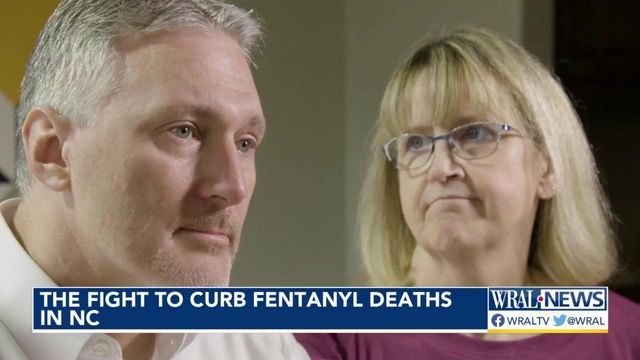New laws, new enforcement and family stories work to reduce OD deaths in NC
WRAL shows how fentanyl has destroyed the lives of thousands of North Carolinians across the state, what the state is doing to fight this epidemic and what more is needed to save lives.
Posted — UpdatedFentanyl is killing people in North Carolina at a record pace.
More than 4,000 people in North Carolina died from drug overdoses in 2021, the most substance abuse related deaths ever recorded in the state. According to the North Carolina Department of Health and Human Services (NCDHHS), 77% of those deaths involved fentanyl.
Lori and Jeff Nash were among those who shared their heartbreaking story of loss. Their daughter – 27-year-old Amanda – died from a fentanyl overdose last March. They had no idea what fentanyl was until she died.
Fentanyl is an opioid. When it's produced by pharmaceutical companies and approved by the FDA, it's used for acute and chronic pain.
Illicit fentanyl that people are dying from is produced by drug cartels and used for money making purposes not for healthcare. As little as two milligrams can lead to death. Drug dealers can use a little amount and make their drugs extremely powerful.
"The entire illicit drug market is, has been contaminated by fentanyl," says North Carolina Attorney General Josh Stein. "And that's why we're seeing an incredible spike in opioid overdose deaths."
WRAL interviewed three different families for Crisis Next Door who all lost children to fentanyl overdoses.
In each case, someone was arrested and charged for selling drugs laced with fentanyl.
"The person they arrested in Amanda's case was arrested with a lot of fentanyl, enough to kill a lot of people," said Jeff Nash.
"What this bill does is our solution to combat the fentanyl and opioid epidemic," said Sen. Danny Britt (R-Hoke).
Right now, the most common sentence now for dealers whose customers die is 10 to 20 months.
Under this bill, dealers with lengthy records could face more than a decade in prison. Those who act with malice could face more than 30 years behind bars.
All of these efforts are aimed at stopping families from going through what the Nash family is feeling right now.
"I think if there's anybody out there who's having suspicions about someone they love, maybe they need to hear Amanda's story," said Jeff Nash.
The opioid crisis in North Carolina
Get help: Opioid, overdose data and resources
• Credits
Copyright 2024 by Capitol Broadcasting Company. All rights reserved. This material may not be published, broadcast, rewritten or redistributed.






